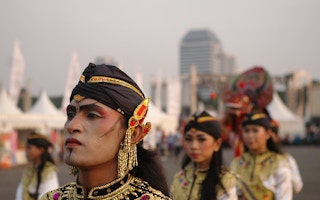At 53, Mak Luké, a transgender woman, will go to the polls for the first time when Indonesia holds an election on Feb. 14 after finally obtaining a government identity card.
Like many trans Indonesians, Mak Luké left her family as a teenager and ended up living on the streets, making it difficult for her to apply for an ID card. That meant she could not access public services, open a bank account - or vote.
Even going to the doctor was “very difficult” without the document, known as the KTP, Mak Luké told Context.
She finally got her KTP in 2021 with support from Jakarta-based LGBTQ+ rights group Suara Kita, which has helped obtain ID cards for hundreds of trans women - who tend to face more stigma and marginalisation than trans men or other LGBTQ+ Indonesians.
She said it has been life-changing - even if the document still carries her male birth name and gender assigned at birth.
Trans people in many countries are fighting for their gender identity to be recognised on official documents, but trans Indonesians can only change their legal gender if they have had gender reassignment surgery.
Despite the many challenges trans Indonesians face today, gender-fluid communities have historically been accepted in the country. The Bugis ethnic group on Sulawesi island, for instance, traditionally recognises five genders, including one that is said to “transcend”, or combine, female and male.
Still, a rising tide of conservative Islam in the world’s largest Muslim-majority country has fuelled anti-LGBTQ+ persecution.
Although same-sex relations are not criminalised across Indonesia, except in the provinces of Aceh and South Sumatra, 92 per cent of Indonesians surveyed by the Pew Research Center in 2023 oppose same-sex marriage.
“
We at the civil administration office must serve all Indonesian citizens with no exception.
Zudan Arif Fakrulloh, former director-general, Civil Registry Service Office
But there are some signs of change, including recognition by the government in 2021 of the particular difficulties trans women face in securing KTPs.
“The problems to get an ID card for trans women is a reflection of the problem that people living below the poverty line face,” said Hartoyo, a 46-year-old LGBTQ+ activist who goes by one name and is one of Suara Kita’s founders.
‘Embracing gender differences’
As one of 20 Suara Kita volunteers working to get ID cards for trans women, Mak Eci has helped with everything from small changes like new photos to acting as a guarantor for those who do not have their biometric information in the system, which all Indonesians are required to do when they reach the age of 17.
“Finally, I see the government gradually embracing gender differences,” said Mak Eci, a 50-year-old trans woman based in West Jakarta, who helped Mak Luké get her ID card.
A memorandum of understanding (MOU) was drawn up in 2021 by Indonesia’s federal Ministry of Home Affairs to resolve issues such as missing legal identity documents at the local administrative level, rather than cases being sent to Jakarta.
The MOU has drastically decreased the time it takes to process these complex cases, from three months to a week, and sometimes an ID card is processed within hours.
“We at the civil administration office must serve all Indonesian citizens with no exception,” said Zudan Arif Fakrulloh, former director-general of the Civil Registry Service Office who signed the MOU.
That followed 10 years of lobbying by Suara Kita, said Hartoyo, who first started working to support trans women to get ID cards in 2011.
Since then, Hartoyo said Suara Kita has helped 650 trans women get new cards nationwide - a process that is ongoing.
“Every week there are new ID cards issued,” said Hartoyo, who is based in the capital, Jakarta.
‘Everything becomes easier’
Victoria Sintara, 36, first arrived in Jakarta 12 years ago from a village in West Kalimantan, where she said she endured years of bullying and abuse.
Her ID card from home expired and she did not have the money to travel back to renew it.
That meant Sintara was without a KTP for three years, until she got a new one with help from Suara Kita.
“Even finding a job (was) difficult for me, despite having a decent education,” Sintara said. “I even resorted to busking.”
Sintara still busks part-time, but she also has a job as a finance officer for a theatre group.
“Everything becomes easier; every task, every place is accessible,” she said.
Besides making day-to-day life easier, ensuring trans women have ID cards was a step towards giving them “a political voice”, said Irwan Hidayana, a professor of gender and sexuality studies at the University of Indonesia.
“Trans women’s participation in elections is an acknowledgement that they are citizens just like other Indonesians,” Hidayana said.
This story is part of a series supported by HIVOS’s Free To Be Me programme.
This story was published with permission from Thomson Reuters Foundation, the charitable arm of Thomson Reuters, that covers humanitarian news, climate change, resilience, women’s rights, trafficking and property rights. Visit https://www.context.news/.










